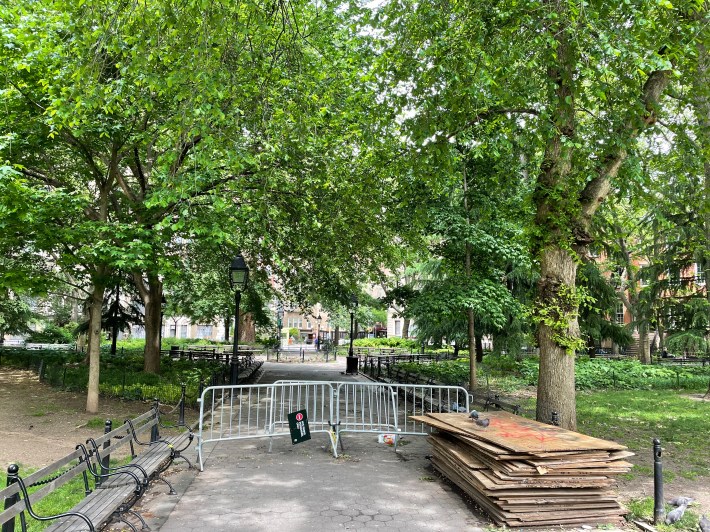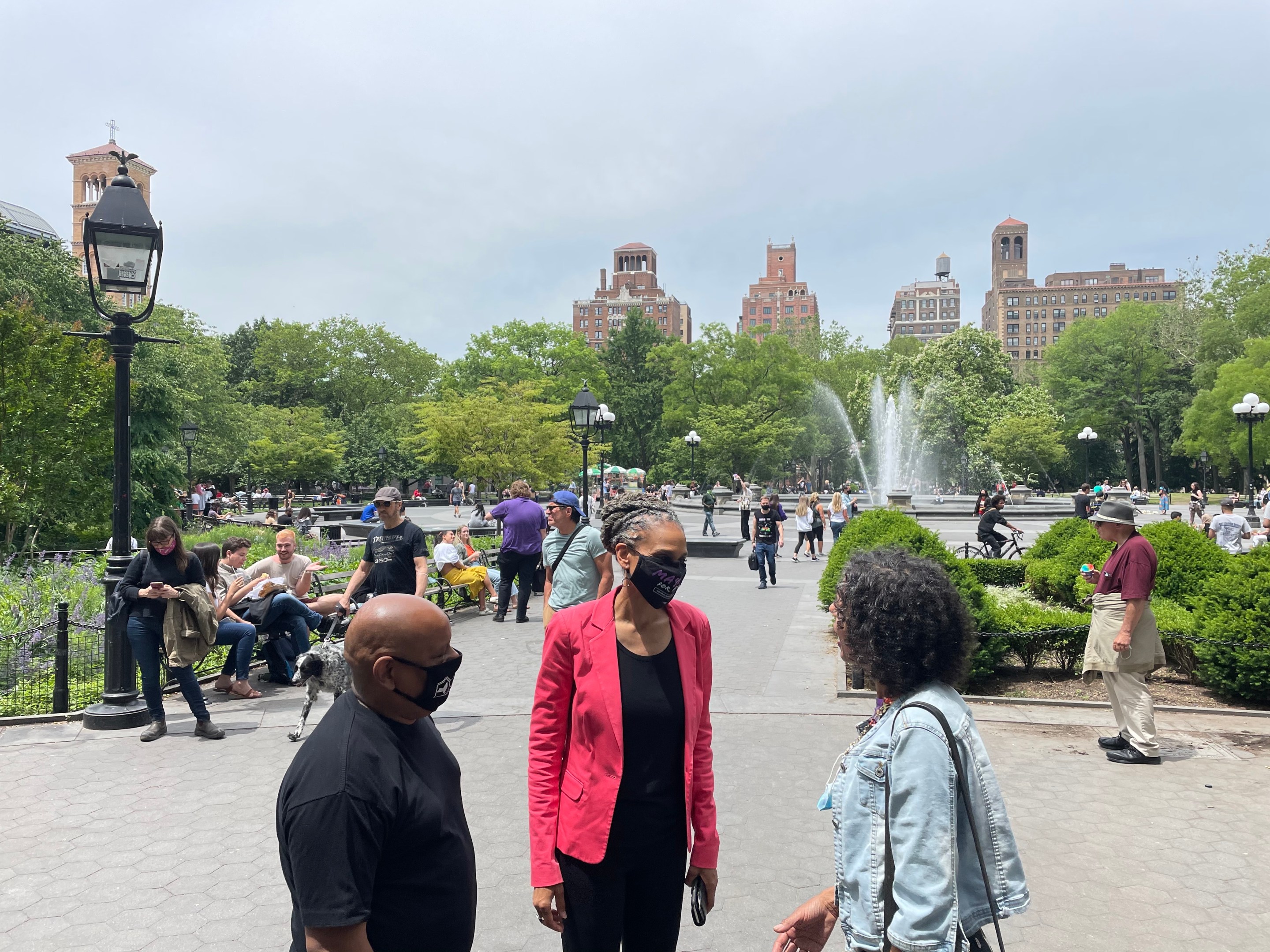If you want to examine some of the biggest issues roiling the 2021 mayoral campaign, take a stroll through Washington Square Park.
The debate over public safety, and how to use city resources to provide adequate housing and social services to New Yorkers who need them can be found in the northwest tip, which is walled off "until further notice," according to the Parks Department. That move was in response to what the NY Post recently described as a "drug den," though robberies and assaults have increased in the Sixth Precinct overall.
Then there is the matter of how much power the police department continues to wield over public space ... and the de Blasio administration. From now on, the entire park will be shut down at 10 p.m. on Fridays, Saturdays, and Sunday nights — two hours earlier than usual — because of "several recent incidents where large, and sometimes violent, groups have refused to leave the park, and engaged in disorderly behavior," according to the NYPD.
Why send dozens of riot cops to clear out a public park and popular protest spot in the summer time? During Pride?
And everywhere are New Yorkers of every walk of life, laughing, kissing, smoking, reading, breaking up, backflipping, making bubbles, tossing dollar bills into trumpet cases, sipping out of brown paper bags, doing the most wonderfully mundane stuff, far away from the past year of death and fear and despair.
On a sunny Tuesday afternoon, Democratic mayoral hopeful Maya Wiley was in the park to announce a component of her housing plan — rental assistance for those earning under $42,000/year, or $60,000 for a family of four.
Hours earlier, Wiley released an ad aimed at solidifying her claim as the most viable progressive candidate remaining by hitting on the one issue that the centrists Eric Adams, Andrew Yang, and Kathryn Garcia dare not express so bluntly: reforming the NYPD.
"They ran into peaceful protesters — beat others to the ground," Wiley's ad voiceover starts, with visuals of police squad cars running over protesters. "And New York's leaders defended it. But it was an injustice to those of us who know Black Lives Matter. I'm Maya Wiley, as a mom and civil rights lawyer, I've had enough. I'll transform the police and keep communities safe. As mayor, I'll be in charge, and I'll get it done. Because it's time the NYPD sees us as people who deserve to breathe."
It is time the NYPD sees us as people who deserve to breathe. Watch my latest ad. pic.twitter.com/ItkZXV1otT
— Maya Wiley (@mayawiley) June 1, 2021
Predictably, the police union heads were outraged by the images of disturbing misconduct, giving Wiley plenty of opportunities to show New Yorkers how she will stand up to the status quo. Given the unions' nonstop, eight-year war against the current mayor who has failed to reform the NYPD, this doesn't mean much.
What does mean a lot — especially to progressives who don't seem to have a standard-bearer right now — is what a Mayor Wiley would do with the cops on Jan. 1, 2022 and thereafter.
In the park on Tuesday, Wiley was less specific when asked what she would do about the park closures.
"Look, our public space has to be our public space, available and open to the public," the candidate told Streetsblog. "Rather than say, 'We will do containment and control,' we’ll do support and participation."
And when given the opportunity to talk plainly about how she would handle officers who abuse their authority (or union police heads who traffic in racism), Wiley was somewhat vague.
"And you know what I say to the police unions, the police department, the police officers of the police department are people too. Whomever you are in this city, if you think we are 'animals,' if you think you are above the law then there is going to be a new sheriff in town after June 22nd that is going to say that every person in this city matters."
That said, Wiley and Comptroller Scott Stringer have both promised to reduce the NYPD's budget by at least $1 billion. Wiley also has plans to spend $10 billion on a capital plan for the city that she says will create 100,000 jobs as well as new housing and infrastructure, and give $5,000 grants to the poorest New Yorkers.
Wiley and Stringer also differ from the moderate candidates in that they believe that the NYPD should not be involved in responding to mental health calls, given how frequently they end with a suffering person being killed.
"A lot of police officers will not say it publicly, but there are a lot of things police officers want changed about policing," Wiley told reporters. "Police officers do not sign up to be New York City police officers to be asked to go deal with mental health crisis response. A huge part of our problem is that we are failing to recognize how much we have failed people who are mentally ill. And that should not be put on the police department."
Other campaigns have been basically silent about the NYPD's decision to use extra police officers to forcible close the park early on weekends. The subject may come up during the second Democratic primary debate on Wednesday night (stream it here).

Brian Rodriguez and David Johnson, two construction workers who were enjoying their lunch break in the park, said they thought closing the park down early in the summertime was overly punitive.
"The pandemic just ended, people need to be outside and enjoy themselves," Rodriguez said. "This is the only park where there is live music almost everywhere you look. It's just really nice."
Yvette Vuono frequently comes to Washington Square Park from her home in East New York "to chill out." The 67-year-old told Streetsblog that closing the western portion of the park had unintended consequences.
"Now, look, this is New York. That was kind of the designated area for fuck ups," she said. "Now it’s all over the park. Does that make any sense?"
Vuono, who livestreams under the handle Queen Ra TV, said she supported the idea of safe injection sites, or places where people who use drugs can do so in controlled settings and with access to social services, as do all of the current top mayoral candidates.
"Because when I was running around here taking drugs, there was no fliers or nothing to help me," said Vuomo, a former crack user who spent her youth in the park, during the late 1970s.
Vuono moved back from Los Angeles last year, and has her own room thanks to a FHEPS voucher. She said she doesn't know who she's voting for in the primary, but was excited that the City Council recently passed legislation that would increase the voucher amount so she could afford a studio apartment.
"Compared to how L.A. treated me for 10 years and then I come back to New York and they treat me like, wow," Vuono said. "De Blasio did something right."






